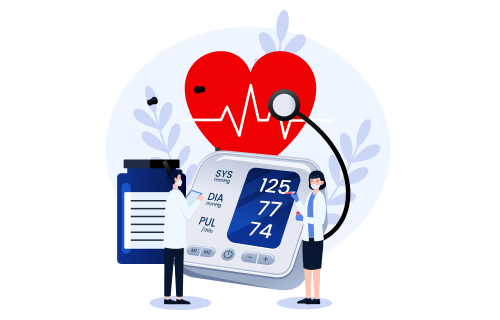Heart palpitations can be a scary experience. Imagine sitting at your desk, or lying in bed at night, and suddenly you feel your heart pounding, fluttering, or skipping beats. The first thought for many people is, “Am I having a heart problem?” While heart palpitations can sometimes signal an underlying medical condition, one of the most common triggers is actually stress.
In this article, we’ll explore the connection between stress and heart palpitations, why it happens, what symptoms to look out for, when you should see a doctor, and how to manage both stress and palpitations naturally.
What Are Heart Palpitations?
Heart palpitations are sensations where you become unusually aware of your heartbeat. People describe them in different ways, such as:
- A fluttering feeling in the chest.
- A pounding or racing heartbeat.
- A sensation of skipped or extra beats.
- Feeling like your heart is “flip-flopping.”
Most of the time, palpitations are harmless and short-lived. However, they can feel uncomfortable and even frightening—especially when stress makes them happen more frequently.
Can Stress Cause Heart Palpitations?
Yes, stress is one of the leading causes of heart palpitations. When you are under stress, your body activates the “fight-or-flight” response. This is an automatic reaction designed to protect you in dangerous situations.
During this response, your body releases stress hormones such as adrenaline and cortisol. These hormones increase your heart rate, blood pressure, and breathing to prepare you to react quickly. As a result, your heart may beat faster or irregularly, leading to palpitations.
So, while stress itself doesn’t damage the heart in the short term, it can cause noticeable changes in how your heartbeat feels.
Why Stress Triggers Heart Palpitations
To better understand the link, let’s break down the process step by step:
- Stressful event or thought occurs → Could be work deadlines, arguments, financial worries, or even overthinking.
- Brain signals the adrenal glands → They release adrenaline and cortisol into the bloodstream.
- Body reacts → Heart rate increases, breathing quickens, muscles tense up.
- Heartbeat feels irregular or more forceful → This is what we recognize as palpitations.
For people who are already anxious, the sensation of palpitations can increase worry, which in turn causes more stress—creating a cycle of stress and palpitations.
Other Causes of Heart Palpitations Besides Stress
Although stress is a major factor, it isn’t the only one. Palpitations can also be triggered by:
- Caffeine and energy drinks – Stimulants increase heart rate.
- Alcohol or smoking – Both affect the heart’s rhythm.
- Medications – Certain cold medicines, inhalers, or thyroid medications.
- Lack of sleep – Exhaustion makes the heart work harder.
- Hormonal changes – Common during pregnancy, menstruation, or menopause.
- Medical conditions – Such as arrhythmias, thyroid problems, or anemia.
This is why it’s important not to ignore frequent palpitations and consult a doctor if they become regular.
Stress-Related Symptoms That Come With Palpitations
When stress is the cause, palpitations usually appear alongside other stress symptoms, such as:
- Sweaty palms
- Shortness of breath
- Tightness in the chest
- Feeling restless or jittery
- Trouble sleeping
- Difficulty concentrating
These signs indicate that stress is taking a toll not only on your emotions but also on your physical health.
When to See a Doctor
Most stress-related palpitations are harmless and go away on their own. But sometimes they can point to more serious heart conditions. You should see a doctor if:
- Palpitations last longer than a few minutes or happen frequently.
- You also feel dizziness, fainting, or extreme fatigue.
- There is chest pain, pressure, or tightness.
- You have a history of heart disease, high blood pressure, or diabetes.
A doctor may run tests like an ECG (electrocardiogram), blood tests, or a Holter monitor to rule out heart-related problems.
How to Manage Stress-Induced Heart Palpitations
The good news is that if stress is behind your palpitations, lifestyle changes and relaxation techniques can make a huge difference.
1. Practice Deep Breathing
Slow, deep breaths help calm the nervous system and bring your heart rate back to normal. Try inhaling for 4 seconds, holding for 4 seconds, and exhaling for 6 seconds.
2. Exercise Regularly
Physical activity reduces stress hormones and improves heart health. Even a daily walk can lower the risk of palpitations.
3. Limit Caffeine and Alcohol
Cutting down on stimulants reduces the likelihood of irregular heartbeats.
4. Improve Sleep
Aim for 7–9 hours of restful sleep to reduce stress and support overall heart function.
5. Mindfulness and Meditation
Practicing mindfulness helps shift focus away from anxiety and lowers stress-related heart symptoms.
6. Talk to a Professional
If stress feels overwhelming, therapy or counseling can help manage emotional triggers.
Can Stress Palpitations Harm the Heart?
Occasional stress-related palpitations are usually harmless. However, chronic stress over time may increase the risk of long-term heart problems such as high blood pressure, heart disease, and arrhythmias. This is why managing stress is not only about comfort but also about protecting your long-term health.
Table: Difference Between Stress Palpitations and Heart Disease Palpitations
| Feature | Stress-Related Palpitations | Heart Disease-Related Palpitations |
|---|---|---|
| Trigger | Emotional stress, anxiety, panic | Exertion, existing heart condition |
| Duration | Short-lived, minutes | May last longer or happen often |
| Symptoms | Fluttering, racing heart, sweating, nervousness | Chest pain, dizziness, fainting, shortness of breath |
| Risk | Usually harmless | May indicate serious health issue |
| Relief | Relaxation, deep breathing, rest | Requires medical attention |
Conclusion
So, can stress cause heart palpitations? The answer is yes. Stress is one of the most common reasons people experience unusual heartbeats. While it often isn’t dangerous, the sensations can be alarming and may affect quality of life.
Learning to manage stress through lifestyle changes, relaxation techniques, and healthy habits can greatly reduce palpitations. However, never ignore frequent or severe episodes—always consult a healthcare provider to rule out underlying heart conditions.
Your heart is sensitive to your emotions, and taking care of both your mental and physical health will keep it strong.
FAQs About Stress and Heart Palpitations
1. Can stress palpitations happen even when I’m resting?
Yes. Palpitations can occur at rest, especially if your mind is overactive with stress or anxiety.
2. How long do stress-related palpitations usually last?
They often last a few seconds to minutes and usually stop once the stress or anxiety eases.
3. Can dehydration make stress palpitations worse?
Yes. Dehydration can affect electrolyte balance and make the heart more sensitive to stress.
4. Is it normal to feel palpitations before an important event, like an exam or interview?
Absolutely. This is a common reaction to stress and usually goes away after the event.
5. Can stress palpitations be completely prevented?
They can’t always be avoided, but managing stress, staying hydrated, avoiding stimulants, and practicing relaxation techniques can significantly reduce them.
Social Sharing
Your Content Goes Here
Latest Posts





